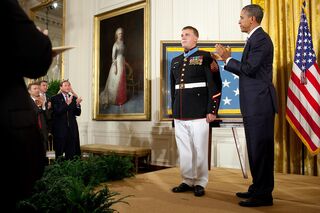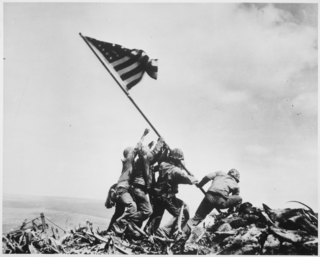Psychology
Psychology Explains Why War Heroes Are Not "Losers"
War heroism is sexier than any other kind of heroism.
Posted September 11, 2020 Reviewed by Devon Frye

There was quite a stir when it was revealed in an article in The Atlantic by Jeffrey Goldberg that President Donald Trump had referred to Americans who had died in combat as “Losers” and “Suckers” during a trip to France in 2018. Trump’s lack of comprehension about why anyone would make such a sacrifice was also reflected by a remark he made to his Chief-of-Staff General John Kelly (who at the time was still the Homeland Security Secretary) on a visit to Arlington National Cemetery on Memorial Day in 2017. While standing before the grave of Kelly’s son Robert, who had died in combat in Afghanistan, Trump turned to Kelly and said “I don’t get it; what was in it for them?”
Setting aside the potential inappropriateness of such a question from the Commander-in-Chief of the armed forces, the question is interesting. What indeed, could possibly be “in it for them” that could lead an individual to take such risks?
According to research by evolutionary psychologists, the answer is “potentially, a lot.”
Why We Love Heroes
We love our war heroes; especially courageous ones who risk their lives.
Legends extolling the valor of warriors from days past are a staple of the folklore in most human societies: Old Testament stories such as David slaying Goliath; the sagas of Beowulf and Odysseus; even the popularity of modern comic book superheroes testifies to the durability of our heroes.
Violence committed against the "right" people at the right time has commonly been a ticket to social success. For example, among the Yanomamo of South America, men who had killed other men, especially during wars and skirmishes with other villages, acquired significantly more wives than men who had not yet killed anyone.
Because having killed someone in war was good for one's reputation, most societies developed ceremonies for recognizing such accomplishments. In the United States, these take the form of prestigious awards such as the Congressional Medal of Honor. Holidays such as Memorial Day and Veteran’s Day exist to elevate the status of heroes who have made the ultimate sacrifice for the good of the group, and to prevent such sacrifices from ever being forgotten or overlooked.
Thus, heroes are held in high esteem because they act in a noble and virtuous manner, setting aside any thoughts of their own well-being for the good of their group, tribe, or nation.
Or do they?
Evolutionary psychologists believe that even apparently selfless impulses such as heroism must provide some adaptive advantage for individuals. Costly Signaling Theory suggests that conspicuous war heroism may be a way for individuals to advertise desirable personal qualities that increase the likelihood that they will be chosen as a mate or an ally and be positioned for access to future resources. For a costly signal to be effective, it must honestly convey valuable information about the individual sending the signal, and it must be impossible to fake.
Many studies confirm that people who sacrifice for the group by engaging in costly activities do in fact achieve elevated social status, respect, and recognition as a result of their selflessness.
No researchers suggest that heroes consciously sit down and calculate all of the benefits that will come their way if they survive the heroic action. Rather, it is thought that such impulses have been selected for because heroic behavior has provided competitive advantages for men throughout human history.
Have Men Evolved to Make War?
Evolutionary psychologists have studied war and conflict with the assumption that a predisposition for warfare has evolved in males because it has historically (and prehistorically) enhanced their reproductive success.

Dutch psychologist Mark Van Vugt has proposed the Male-Warrior Hypothesis as a way of explaining the results of research demonstrating that men show stronger group identification and more cooperation with in-group members than do women during times of threat from outside groups. His theory suggests that men have evolved a predisposition to engage in collective cooperative aggression against out-groups, a tendency that has likely been strongly reinforced through cultural traditions and socialization.
A team of European psychologists explored the proposition that war provides an arena for men to compete and impress both their male rivals and females who might be potential mates. In one study, they found that 464 American men who had won the Medal of Honor during World War II eventually had more children than other U.S. servicemen who had not been so heroically distinguished. This is consistent with the idea that heroism gets rewarded with greater reproductive success.
In a second study, 92 women rated the sexual attractiveness of men who had behaved heroically in war as being higher than that of soldiers who had served but not been identified as heroes. Tellingly, women did not show this increased attraction toward men who had behaved heroically in sports or business situations. A third study revealed that behaving heroically in war does not increase the attractiveness of female war heroes to men.
Young men are particularly concerned with status and heroic opportunities for sound evolutionary reasons. In early human societies, competitive success or failure in early adulthood determined a man’s standing in a social group for the rest of his life. Hence, it should not be surprising that historical data confirm that the concentration of young men in a population is one of the best predictors of when a society is most likely to go to war.
The idea that men compete with each other to impress women has clearly been around for quite some time. For example, the Sioux warrior Rain in the Face once commented on the fact that the presence of women in a war party caused his warriors to vie with one another more intensely in displaying their valor.
How Could Such Risky Behavior Be Adaptive?
War is costly and risky, and for male psychology to have evolved a predisposition for going to war, several essential conditions must be met. John Tooby and Leda Cosmides have identified four conditions that would be particularly important. First of all, successful soldiers must have greater sexual access to women than non-combatants. Secondly, coalitions of fighters must believe that they will be victorious. Thirdly, the rewards that each warrior receives must be proportionate to the risks he has taken and the importance of his contributions. In other words, cheaters should never prosper. And finally, men going to war must not know for sure who will live and who will die; there must be a protective “veil of ignorance.”
In short, heroism in time of war is sexier than any other kind of heroism, but only for men. This is not to say that women do not behave heroically or that their sacrifice is any less noble. It is just that war heroism by women does not seem to be tied directly to reproductive success in the same way it may be for men.




